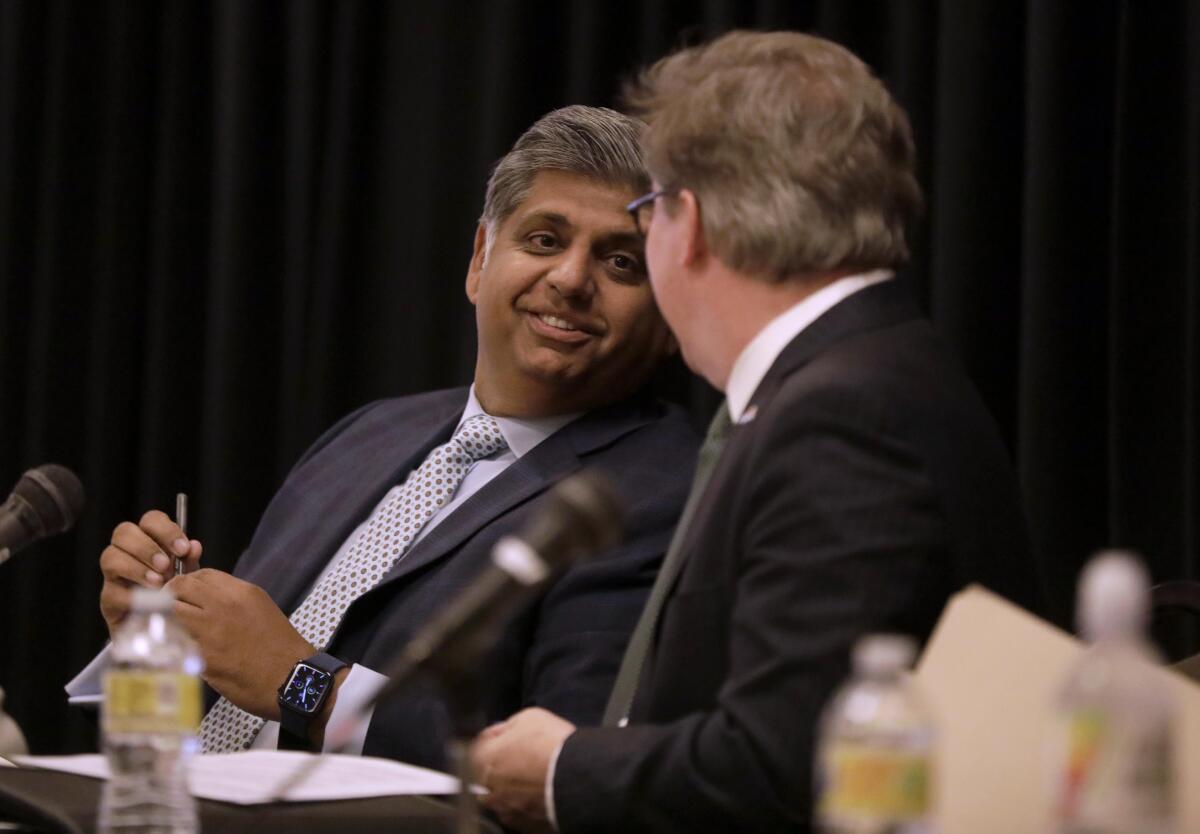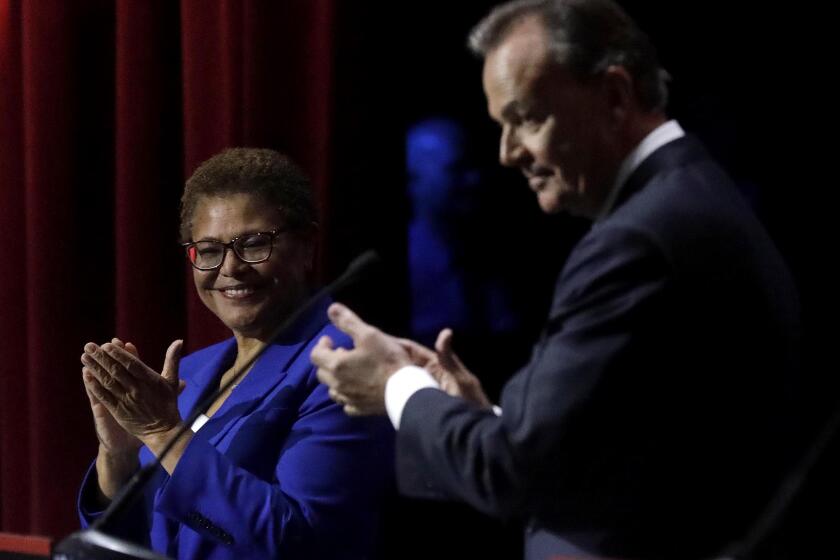We need straight talk, please, from Caruso and Bass about prosecutorial discretion

- Share via
The crazy thing about Los Angeles city attorney candidate Faisal Gill’s call for a 100-day pause in the filing of some misdemeanors isn’t the plan itself. In fact, taking a brief timeout from filing new charges in order to evaluate the office’s caseload, and then considering how to reallocate resources away from offenses that are best handled by other parts of the justice and health systems, makes good sense.
No, the crazy part is the response by other candidates. For mayor, not for city attorney.
Mall developer Rick Caruso, who finished second in the June 7 mayoral primary, held a news conference Friday to criticize top vote-getter Rep. Karen Bass for supporting Gill. Caruso’s implication is that Bass is a dangerous radical for backing a city attorney candidate running on some kind of lax-on-crime, let-them-all-go platform. Caruso brought small-business owners with him to underscore his point, most likely hoping to stoke voter anxiety over shoplifting and other property crimes — even though they’re not among the offenses Gill said he would seek to divert from the court system.
It ought to have been a perfect opportunity for Bass to ridicule Caruso’s long line of brazen campaign falsehoods about crime and his disingenuous plans for dealing with it.
It’s easy to blanket airwaves and mailboxes with promises that have little basis in reality, especially when a candidate spends more than $40 million.
Instead, Bass’ campaign said that she, too, disagreed with Gill’s pause on new misdemeanor prosecutions, which has been on his campaign website since March, and that she had already pulled her support for him earlier in the week.
She comes off looking skittish. Caruso comes off as more demagogic than ever.
Gill did himself no favors in presenting his plan. His wording is clumsy and allows voters to believe that he simply wouldn’t prosecute most crimes committed during the “pause.” What he meant, he told a Times editorial writer, is that he wouldn’t prosecute during that period but might choose to afterward. In other words, it was not meant to be like the movie “The Purge,” in which crimes are free of any consequences for a period.
To be clear, The Times has endorsed Bass for mayor and Hydee Feldstein Soto for city attorney, and neither Gill’s sensible plan nor Bass’ puzzling revocation are enough to make us consider changing course.
Still, it would be nice if all candidates injected a bit more honesty and clarity and a lot less political calculation into their statements concerning the criminal justice system. Some of our society’s deepest and most intractable problems are driven by politicians who either fail to understand how the system works, or who understand all too well but unscrupulously play on public fears in order to win power. Some straight talk is desperately needed on subjects like the vital role of prosecutorial discretion.
To hear Caruso, you’d think that discretion to file charges is some kind of left-wing manifesto dreamed up by a handful of police abolitionists on a day off between marches.
On his website, Caruso says:
“Rick will immediately make it mandatory for the City Attorney to prosecute misdemeanors. Having an elected City Attorney shouldn’t mean they can selectively enforce some laws and not others.”
Here are the L.A. Times’ editorial board endorsements for elected offices in Los Angeles city and county, LAUSD, superior court, statewide offices, the state legislature and U.S. House and Senate seats.
No, he would not, and could not, make it mandatory for the city attorney to prosecute anything, because as mayor he would have no such power over another independently elected official.
When the editorial board asked him about that pledge before the primary, he admitted that he couldn’t actually force the city attorney to do anything, contrary to his campaign promise to do exactly that, but he could persuade.
“I have a big bully pulpit,” he said.
More to the point, though, any prosecutor, liberal or conservative, tough or soft on crime, must selectively decide what charges to file, and it would be foolish or a blatant lie for them to claim otherwise. Without the ability to focus on particular offenses and the needs of particular communities, no city attorney or district attorney could ever have a large enough prosecutorial staff to charge every suspected lawbreaker.
All prosecutors charge selectively, of necessity. The question is what they select, and why. Do they charge only those crimes that get the most headlines? Or do they consider what will be better for public safety? There are times when drug or mental health treatment results in better outcomes than prosecution.
Prosecutors constantly have to pick their battles among loitering and wage theft, drug possession and illegal gun sales. The reason we elect prosecutors is to choose someone who will exercise discretion in accordance with their values and priorities.
Signatures are currently being examined as part of a recall attempt against L.A. County Dist. Atty. George Gascón, in large part because he declared bright-line rules about what his prosecutors may charge and what sentences they may seek. Critics claim such an approach flouts the laws and punishments on the books, but in fact all it does is eliminate much of the secrecy and inequity otherwise inherent in prosecutorial decision-making. The public, and offenders, ought to be able to know in advance how prosecutors will exercise their discretion.
That kind of transparency is what has Caruso so outraged and Bass so wary. It also ought to be what every savvy voter demands from all candidates, for every office.
More to Read
A cure for the common opinion
Get thought-provoking perspectives with our weekly newsletter.
You may occasionally receive promotional content from the Los Angeles Times.











